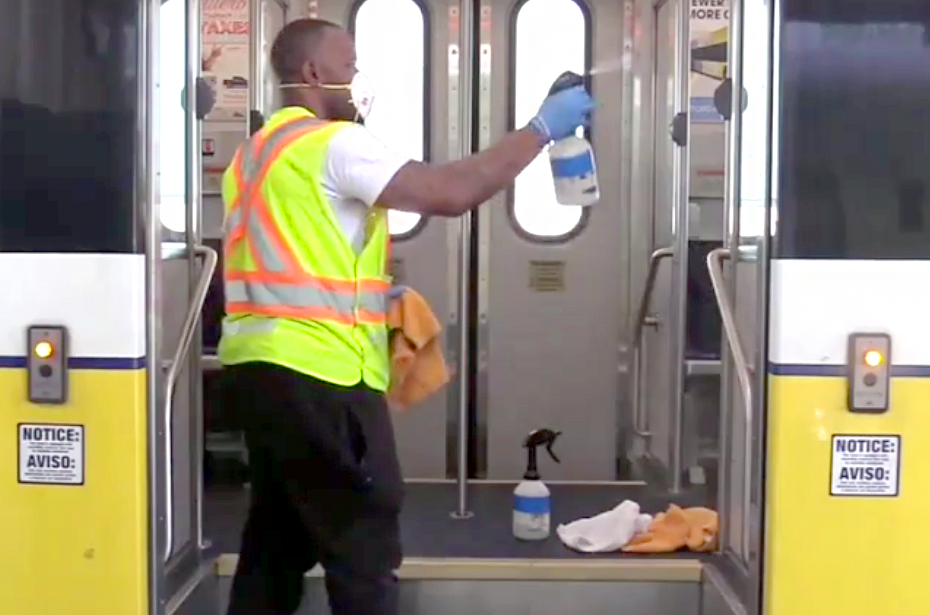- Ask DART
- About
- News
How DART is Responding to the Coronavirus
 How DART is Responding to the Coronavirus
How DART is Responding to the Coronavirus

DART remains committed to doing everything we can to keep our riders safe. The agency is in close contact with local, state and national health authorities, including the Texas Department of State Health Services and the CDC, and will continue to monitor the situation for residents in the North Texas region.Following are answers to the most frequently asked questions:
How often are buses, light rail cars and TRE trains cleaned?
DART buses, light rail vehicles and TRE trains are cleaned nightly.
Vehicles now receive additional cleanings throughout the day. High touch surface areas are cleaned with an EPA approved cleaning agent. High touch surfaces include handrails, door buttons, grab rails and hanging straps.
Vehicles are cleaned with products identified by the Environmental Protection Agency (EPA) as successful in killing the coronavirus, as well as influenza, rhinovirus, norovirus, salmonella, staphylococcus, and e-coli.
DART is prepared to escalate our cleaning process for transit vehicles should the need arise.
We continue to enforce our procedures to isolate vehicles and areas that have been exposed to unsanitary and unhygienic situations. This includes removing vehicles from service that have been exposed to biohazard situations from passengers.
What if you see something that you're concerned about?
As a passenger, if you see an unhygienic surface that needs attention, please contact DART Customer Service at (214) 979-1111, or you can use the "DART Say Something" app, which can be downloaded from the Apple Store or Google Play.
We want to remind all our riders that the best way to stay informed about changes in service is through DART Alerts. Customers can sign-up for DART Alerts at www.dart.org.
How are DART employees being protected?
DART cleaning crews and personnel are required to wear personal protective equipment to prevent contamination from possibly infectious diseases, and we will continue to keep them informed and remind them about good hygiene practices.For more information, visit DART.org/health.
Categories : Ask DART Community News - Community
How DART is Responding to the Coronavirus
 How DART is Responding to the Coronavirus
How DART is Responding to the Coronavirus

DART remains committed to doing everything we can to keep our riders safe. The agency is in close contact with local, state and national health authorities, including the Texas Department of State Health Services and the CDC, and will continue to monitor the situation for residents in the North Texas region.Following are answers to the most frequently asked questions:
How often are buses, light rail cars and TRE trains cleaned?
DART buses, light rail vehicles and TRE trains are cleaned nightly.
Vehicles now receive additional cleanings throughout the day. High touch surface areas are cleaned with an EPA approved cleaning agent. High touch surfaces include handrails, door buttons, grab rails and hanging straps.
Vehicles are cleaned with products identified by the Environmental Protection Agency (EPA) as successful in killing the coronavirus, as well as influenza, rhinovirus, norovirus, salmonella, staphylococcus, and e-coli.
DART is prepared to escalate our cleaning process for transit vehicles should the need arise.
We continue to enforce our procedures to isolate vehicles and areas that have been exposed to unsanitary and unhygienic situations. This includes removing vehicles from service that have been exposed to biohazard situations from passengers.
What if you see something that you're concerned about?
As a passenger, if you see an unhygienic surface that needs attention, please contact DART Customer Service at (214) 979-1111, or you can use the "DART Say Something" app, which can be downloaded from the Apple Store or Google Play.
We want to remind all our riders that the best way to stay informed about changes in service is through DART Alerts. Customers can sign-up for DART Alerts at www.dart.org.
How are DART employees being protected?
DART cleaning crews and personnel are required to wear personal protective equipment to prevent contamination from possibly infectious diseases, and we will continue to keep them informed and remind them about good hygiene practices.For more information, visit DART.org/health.
Categories : Ask DART Community News - Knowledge
How DART is Responding to the Coronavirus
 How DART is Responding to the Coronavirus
How DART is Responding to the Coronavirus

DART remains committed to doing everything we can to keep our riders safe. The agency is in close contact with local, state and national health authorities, including the Texas Department of State Health Services and the CDC, and will continue to monitor the situation for residents in the North Texas region.Following are answers to the most frequently asked questions:
How often are buses, light rail cars and TRE trains cleaned?
DART buses, light rail vehicles and TRE trains are cleaned nightly.
Vehicles now receive additional cleanings throughout the day. High touch surface areas are cleaned with an EPA approved cleaning agent. High touch surfaces include handrails, door buttons, grab rails and hanging straps.
Vehicles are cleaned with products identified by the Environmental Protection Agency (EPA) as successful in killing the coronavirus, as well as influenza, rhinovirus, norovirus, salmonella, staphylococcus, and e-coli.
DART is prepared to escalate our cleaning process for transit vehicles should the need arise.
We continue to enforce our procedures to isolate vehicles and areas that have been exposed to unsanitary and unhygienic situations. This includes removing vehicles from service that have been exposed to biohazard situations from passengers.
What if you see something that you're concerned about?
As a passenger, if you see an unhygienic surface that needs attention, please contact DART Customer Service at (214) 979-1111, or you can use the "DART Say Something" app, which can be downloaded from the Apple Store or Google Play.
We want to remind all our riders that the best way to stay informed about changes in service is through DART Alerts. Customers can sign-up for DART Alerts at www.dart.org.
How are DART employees being protected?
DART cleaning crews and personnel are required to wear personal protective equipment to prevent contamination from possibly infectious diseases, and we will continue to keep them informed and remind them about good hygiene practices.For more information, visit DART.org/health.
Categories : Ask DART Community News - Leading Mobility
- language



 Translate
Translate
Leave a comment